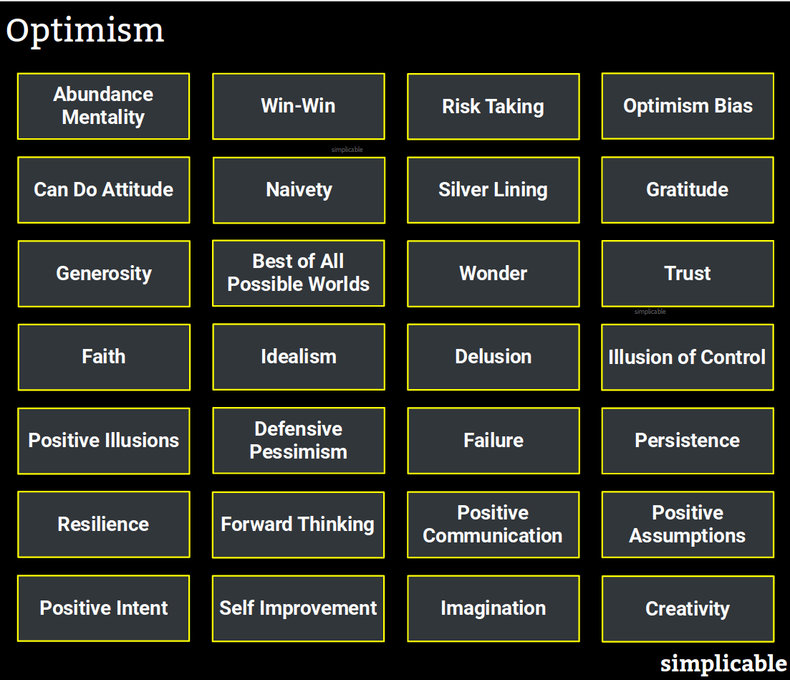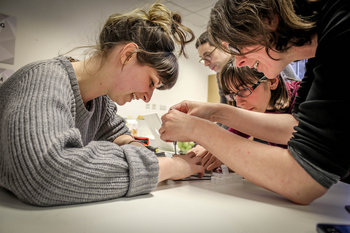

Abundance Mentality
Abundance mentality is the belief that there is more than enough for everyone such that you are happy to see others succeed. This is the opposite of schadenfreude, or a sense of joy sparked by the misfortunes of others.Win-Win
A tendency to look for solutions that benefit everyone as opposed to making gains at the expense of others.Risk Taking
A willingness to take risks.Optimism Bias
Optimism bias is a tendency to overestimate opportunity and underestimate risk.Can Do Attitude
A willingness to seize opportunities that present themselves without hesitation. For example, a willingness to accept a work assignment that is a challenge for you that may lead to a promotion.Naivety
A willingness to believe people and stories that experience might suggest are unworthy of belief. Optimists tend to avoid pessimism and risk being naive as a result.Silver Lining
The practice of looking for the positive implications of a seemingly negative situation. This is based on the observation that things that feel negative at the time may later be recognized as having pushed you in ways that created wonderful opportunities.Gratitude
Looking on the positive side of things may create a sense of gratitude whereby an optimist feels a sense of joy for the opportunities they have been given.Generosity
Generosity whereby an optimist gives to others out of a sense of gratitude for what they have received.Best of All Possible Worlds
The philosophy that this world is the best possible world that could exist such that seemingly bad things only exist to enrich experience. For example, how could you appreciate water if you had never experienced the pain of thirst?Wonder
A positive sense of amazement at the world. For example, a sense of wonder at the beauty of an ocean.Trust
Optimists have a high capacity for trust as they see the positives in others.Faith
Faith is complete and unconditional trust in someone or something. Optimists often believe that the world is on their side and have faith that things will work out well. In some cases, they attribute this to a philosophy or religious belief.Idealism
Idealism is the belief that the world is a product of ideas and not the other way around.Delusion
Strongly holding beliefs that are fully incorrect. For example, the belief that you can fly based on nothing but optimism. This is a dangerous and extreme type of optimism that is destructive.Illusion of Control
The belief that you can control things that are fully beyond your control. For example, a gambler who believes they can influence their luck with rituals or good luck charms.Positive Illusions
Viewing yourself and those who are close to you in an unrealistic light. For example, an illusion of superiority whereby an individual views themselves are more talented or high status than others despite no evidence that this is true.Defensive Pessimism
Defensive pessimism is the directed use of pessimism to validate optimistic ideas. In other words, optimism and pessimism need not be mutually exclusive but rather can be used as different thinking phases. For example, optimism is useful for brainstorming ideas and pessimism is useful for validating a decision or solution. Defensive pessimism can be used to defeat biases related to optimism such as optimism bias, illusion of control and illusion of superiority.Failure
Optimists may experience a large number of failures due to risk taking and biases related to optimism. This may sound negative but is also a process of creative destruction whereby failures may create new ideas and directions.Persistence
Failure is often not final and the optimistic may press on for an extend period of time with no results and frequent problems. This posses a problem because it is hard to tell the difference between a period of persistence that brings results and a situation where you are lacking something such that results will never come. This period is known as the trough of sorrow. By pushing themselves through the trough of sorrow, optimists can obtain either spectacular results or tragic failures that consume many years of effort.Resilience
An failures that an optimist survives will build resilience as optimists bounce back from failure. This may be one reason that children tend to be optimistic as it drives them forward to learn and gain experience.Forward Thinking
Optimists focus on potential and therefore often think of the future. This may help avoid the common tendency to dwell on a past that can't be changed.Positive Communication
An ability to communicate information in a positive way. For example, presenting business problems as an opportunity to build out competitive advantages. Positive communication can go too far as wrapping inherently negative information in pleasantries can be perceived negatively.Positive Assumptions
Optimists try to make positive assumptions about others. For example, if someone is lost an optimist might assume they need help where a cynic assumes they are an idiot.Positive Intent
There is often great ambiguity in communication such that a single statement can be interpreted as having either positive or negative intent. For example, if somebody says "nice shoes" you might think they are being sarcastic or might think they actually like your shoes. Naturally, optimists tend to assume positive intent. This has several advantages as optimists don't become defensive about innocuous comments. They also may simply be oblivious to passive aggressive insults such that they remain unaffected.Self Improvement
Some optimists are moving forward too fast to worry about petty insults and jealousy. They may focus on improving themselves as opposed to finding fault in others.Imagination
Optimism is associated with imagination as optimism may be motivated by an ability to see a rich set of future possibilities.Creativity
Optimism is a basis for creativity as this requires risk taking, brave experimentation and a willingness to challenge pessimists who tend to defend the status quo.| Overview: Optimism | ||
Type | ||
Definition | The practice of being hopeful by focusing on the potential and positives in a situation. | |
Related Concepts | ||













































